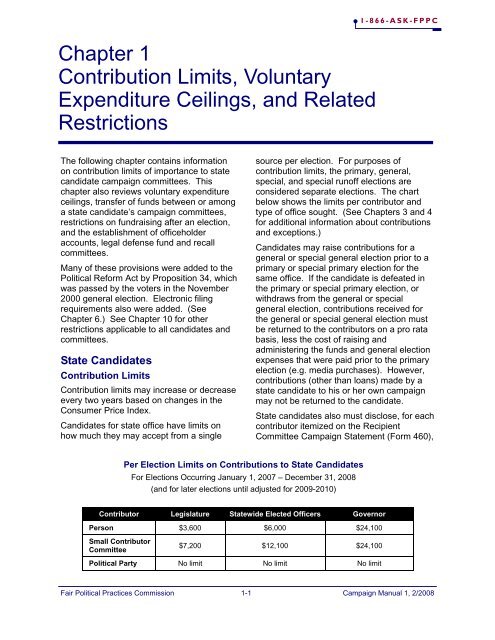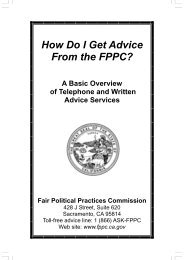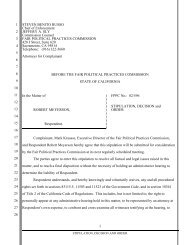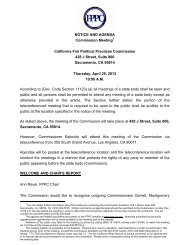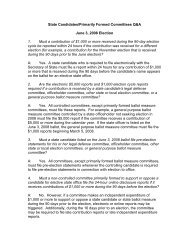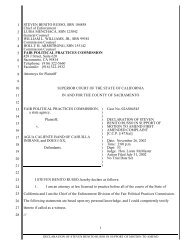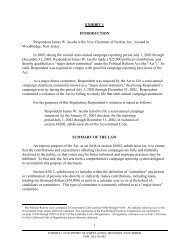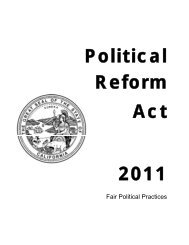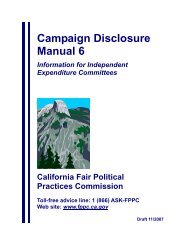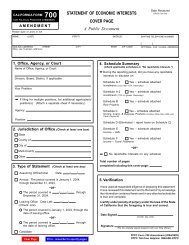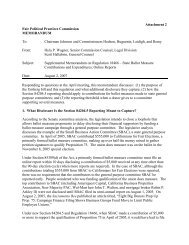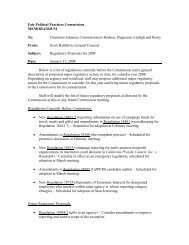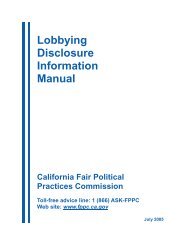Chapter 1 Contribution Limits, Voluntary Expenditure Ceilings, and ...
Chapter 1 Contribution Limits, Voluntary Expenditure Ceilings, and ...
Chapter 1 Contribution Limits, Voluntary Expenditure Ceilings, and ...
Create successful ePaper yourself
Turn your PDF publications into a flip-book with our unique Google optimized e-Paper software.
<strong>Chapter</strong> 1<br />
<strong>Contribution</strong> <strong>Limits</strong>, <strong>Voluntary</strong><br />
<strong>Expenditure</strong> <strong>Ceilings</strong>, <strong>and</strong> Related<br />
Restrictions<br />
The following chapter contains information<br />
on contribution limits of importance to state<br />
c<strong>and</strong>idate campaign committees. This<br />
chapter also reviews voluntary expenditure<br />
ceilings, transfer of funds between or among<br />
a state c<strong>and</strong>idate’s campaign committees,<br />
restrictions on fundraising after an election,<br />
<strong>and</strong> the establishment of officeholder<br />
accounts, legal defense fund <strong>and</strong> recall<br />
committees.<br />
Many of these provisions were added to the<br />
Political Reform Act by Proposition 34, which<br />
was passed by the voters in the November<br />
2000 general election. Electronic filing<br />
requirements also were added. (See<br />
<strong>Chapter</strong> 6.) See <strong>Chapter</strong> 10 for other<br />
restrictions applicable to all c<strong>and</strong>idates <strong>and</strong><br />
committees.<br />
State C<strong>and</strong>idates<br />
<strong>Contribution</strong> <strong>Limits</strong><br />
<strong>Contribution</strong> limits may increase or decrease<br />
every two years based on changes in the<br />
Consumer Price Index.<br />
C<strong>and</strong>idates for state office have limits on<br />
how much they may accept from a single<br />
<strong>Chapter</strong> 1 — State Restrictions<br />
source per election. For purposes of<br />
contribution limits, the primary, general,<br />
special, <strong>and</strong> special runoff elections are<br />
considered separate elections. The chart<br />
below shows the limits per contributor <strong>and</strong><br />
type of office sought. (See <strong>Chapter</strong>s 3 <strong>and</strong> 4<br />
for additional information about contributions<br />
<strong>and</strong> exceptions.)<br />
C<strong>and</strong>idates may raise contributions for a<br />
general or special general election prior to a<br />
primary or special primary election for the<br />
same office. If the c<strong>and</strong>idate is defeated in<br />
the primary or special primary election, or<br />
withdraws from the general or special<br />
general election, contributions received for<br />
the general or special general election must<br />
be returned to the contributors on a pro rata<br />
basis, less the cost of raising <strong>and</strong><br />
administering the funds <strong>and</strong> general election<br />
expenses that were paid prior to the primary<br />
election (e.g. media purchases). However,<br />
contributions (other than loans) made by a<br />
state c<strong>and</strong>idate to his or her own campaign<br />
may not be returned to the c<strong>and</strong>idate.<br />
State c<strong>and</strong>idates also must disclose, for each<br />
contributor itemized on the Recipient<br />
Committee Campaign Statement (Form 460),<br />
Contributor Legislature Statewide Elected Officers Governor<br />
Person $3,600 $6,000 $24,100<br />
Small Contributor<br />
Committee<br />
Per Election <strong>Limits</strong> on <strong>Contribution</strong>s to State C<strong>and</strong>idates<br />
For Elections Occurring January 1, 2007 – December 31, 2008<br />
(<strong>and</strong> for later elections until adjusted for 2009-2010)<br />
$7,200 $12,100 $24,100<br />
Political Party No limit No limit No limit<br />
1-866-ASK-FPPC<br />
Fair Political Practices Commission 1-1 Campaign Manual 1, 2/2008
<strong>Chapter</strong> 1 — State Restrictions<br />
the total amount that has been received from<br />
the contributor for the primary <strong>and</strong> general<br />
elections. (See <strong>Chapter</strong> 7.) In addition,<br />
contributions from affiliated entities are<br />
aggregated for purposes of the limits. (See<br />
<strong>Chapter</strong> 3.)<br />
Loans<br />
Loans are contributions subject to limits.<br />
However, if a loan has been repaid, the<br />
lender, guarantor, endorser, or cosigner may<br />
make additional contributions to the same<br />
c<strong>and</strong>idate or committee up to the limit.<br />
Extensions of Credit<br />
When there is an agreement with the<br />
provider of goods or services that a state<br />
c<strong>and</strong>idate or committee will pay for goods or<br />
services on credit, the goods or services may<br />
become a contribution to the c<strong>and</strong>idate <strong>and</strong><br />
be subject to contribution limits if it remains<br />
unpaid after 45 days. (See <strong>Chapter</strong> 3.)<br />
C<strong>and</strong>idate’s Personal Funds<br />
<strong>Limits</strong> do not apply to a c<strong>and</strong>idate’s personal<br />
funds contributed to his or her own campaign.<br />
However, a state c<strong>and</strong>idate may not have<br />
loans to his or her campaign of more than<br />
$100,000 outst<strong>and</strong>ing at any one time, <strong>and</strong><br />
may not charge interest on loans made to the<br />
committee. The $100,000 limit on personal<br />
loans applies to loans from the c<strong>and</strong>idate’s<br />
personal funds as well as to loans obtained<br />
by the c<strong>and</strong>idate from a commercial lending<br />
institution which the c<strong>and</strong>idate lends to his or<br />
her campaign. “Campaign” includes both the<br />
primary <strong>and</strong> general, or special <strong>and</strong> special<br />
runoff, elections. However, if a c<strong>and</strong>idate<br />
has opened committees for more than one<br />
office or more than one election (for<br />
example, the c<strong>and</strong>idate has a committee for<br />
his or her current term <strong>and</strong> one for<br />
reelection), he or she may make loans up to<br />
$100,000 to each committee.<br />
Example<br />
Bernard Ernest, a State Senate<br />
c<strong>and</strong>idate, loans his campaign<br />
$50,000 before the primary election. Just<br />
before the general election, Bernard wants to<br />
loan his committee some more funds. Since<br />
the committee has not paid down on the<br />
original $50,000 loan, Bernard may loan no<br />
more than $50,000 to his committee.<br />
<strong>Contribution</strong>s from State Lobbyists<br />
A state lobbyist may not contribute to a state<br />
officeholder or c<strong>and</strong>idate’s campaign if the<br />
lobbyist is registered to lobby the agency of<br />
the elected officer or the agency to which the<br />
c<strong>and</strong>idate is seeking election. The lobbyist<br />
also may not contribute to any other<br />
committee controlled by that state c<strong>and</strong>idate,<br />
including a ballot measure committee, a local<br />
committee, a legal defense fund, or an<br />
officeholder account.<br />
Example<br />
Richard receives an invitation to<br />
attend a political fundraiser from<br />
an individual running for Insurance<br />
Commissioner. Richard is a lobbyist<br />
registered to lobby the State Legislature, the<br />
Secretary of State, <strong>and</strong> the Governor.<br />
Although Richard may not make a<br />
contribution to anyone who holds or is a<br />
c<strong>and</strong>idate for the Assembly, Senate,<br />
Secretary of State, or Governor, he may<br />
make a contribution to the c<strong>and</strong>idate for<br />
Insurance Commissioner.<br />
<strong>Contribution</strong>s to Other C<strong>and</strong>idates<br />
State c<strong>and</strong>idates may contribute no more<br />
than $3,600 per election to another<br />
c<strong>and</strong>idate for elective state office. The<br />
$3,600 limit applies in the aggregate to<br />
contributions made from personal funds <strong>and</strong><br />
all campaign funds held by the c<strong>and</strong>idate.<br />
For example, an Assembly c<strong>and</strong>idate may<br />
not contribute more than $3,600 per election<br />
to a c<strong>and</strong>idate for Governor, even though the<br />
limit for Governor is higher. In addition, a<br />
state c<strong>and</strong>idate may not contribute more than<br />
$3,600 to a ballot measure committee, a<br />
legal defense fund, or a committee for local<br />
election, that is controlled by another state<br />
Fair Political Practices Commission 1-2 Campaign Manual 1, 2/2008
c<strong>and</strong>idate. This limit may increase or<br />
decrease every two years based on changes<br />
in the Consumer Price Index.<br />
<strong>Voluntary</strong> <strong>Expenditure</strong> Ceiling<br />
State c<strong>and</strong>idates must declare on the<br />
C<strong>and</strong>idate Intention Statement (Form 501)<br />
whether they accept the voluntary<br />
expenditure ceiling established for each<br />
election. C<strong>and</strong>idates who accept the ceiling<br />
are designated in either the state ballot<br />
pamphlet (statewide c<strong>and</strong>idates) or the voter<br />
information portion of the sample ballot<br />
(Senate <strong>and</strong> Assembly c<strong>and</strong>idates) <strong>and</strong> may<br />
purchase space to place a 250-word<br />
statement there.<br />
The c<strong>and</strong>idate must choose to accept or<br />
reject the expenditure ceilings for both the<br />
primary <strong>and</strong> general (or special primary <strong>and</strong><br />
special general) elections at the time of filing<br />
Form 501. Until the deadline for filing<br />
nomination papers (Elections Code Section<br />
8020), the c<strong>and</strong>idate may amend the Form<br />
501 up to two times to change his or her<br />
expenditure ceiling declaration, as long as<br />
the c<strong>and</strong>idate has not exceeded the<br />
applicable expenditure ceiling. In addition, a<br />
c<strong>and</strong>idate who declined the ceiling for the<br />
primary (or special) election but did not<br />
<strong>Chapter</strong> 1 — State Restrictions<br />
exceed it may amend his or her Form 501<br />
within 14 days after the primary (or special)<br />
election to accept the ceiling for the general<br />
(or special runoff) election.<br />
<strong>Voluntary</strong> expenditure ceilings may increase<br />
or decrease every two years based on<br />
changes in the Consumer Price Index.<br />
QuickTIPS<br />
The voluntary expenditure ceiling<br />
does not apply to c<strong>and</strong>idates for<br />
judge or the State Public Employees<br />
Retirement System Board.<br />
All expenditures for a state office <strong>and</strong><br />
election must be made by the c<strong>and</strong>idate’s<br />
designated campaign committee for that<br />
election. Campaign expenditures for a<br />
particular state office may not be made by<br />
any other committee controlled by the<br />
c<strong>and</strong>idate.<br />
<strong>Expenditure</strong>s that count toward the voluntary<br />
expenditure ceiling include only “campaign<br />
expenditures.” Generally, these<br />
expenditures (including unpaid bills) must be<br />
counted toward the next election that follows<br />
the date of the expenditure. <strong>Expenditure</strong>s<br />
made on the day of an election must be<br />
counted toward that election. <strong>Expenditure</strong>s<br />
covered by this rule include the following:<br />
Proposition 34 <strong>Voluntary</strong> <strong>Expenditure</strong> <strong>Ceilings</strong> for C<strong>and</strong>idates for<br />
Elective State Offices<br />
For Elections Occurring January 1, 2007 – December 31, 2008<br />
Office Primary/Special Election General/Special Runoff Election<br />
Assembly $483,000 $845,000<br />
Senate $724,000 $1,086,000<br />
Governor $7,243,000 $12,071,000<br />
Lt. Governor, Attorney General,<br />
Insurance Commissioner, Controller,<br />
Secretary of State, Supt. of Public<br />
Instruction, Treasurer<br />
$4,828,000 $7,243,000<br />
Board of Equalization $1,207,000 $1,811,000<br />
Fair Political Practices Commission 1-3 Campaign Manual 1, 2/2008
<strong>Chapter</strong> 1 — State Restrictions<br />
• Purchase, mailing, or distribution of<br />
campaign literature, signs, buttons,<br />
bumper stickers, <strong>and</strong> similar items.<br />
• Telephone banks, including costs of<br />
design, operation, installation, or rental of<br />
telephone lines <strong>and</strong> equipment; toll<br />
charges; personnel costs; rental of office<br />
space; <strong>and</strong> associated consultants’ fees.<br />
• Professional services, including campaign<br />
consultants <strong>and</strong> pollsters, unless specific<br />
fees or costs are allocated to a different<br />
election under a contract with the person<br />
providing the services.<br />
• Overhead expenses, including office<br />
space, utilities, office equipment,<br />
furnishings, supplies, internal copying <strong>and</strong><br />
printing, monthly telephone charges,<br />
personnel costs, <strong>and</strong> travel expenses.<br />
<strong>Expenditure</strong>s for radio, television,<br />
newspaper, or other media advertising count<br />
toward the election following the date<br />
specified in the contract for dissemination of<br />
the advertisement. If the ad will be published<br />
or broadcast on the day of an election, the<br />
expenditure counts toward that election.<br />
<strong>Expenditure</strong>s for campaign fundraising are<br />
counted toward the election for which the<br />
funds were raised. If it is not possible to<br />
allocate fundraising costs using this method,<br />
allocate the expenditures to the election<br />
following the date they were made. If postelection<br />
expenditures are made to raise<br />
funds to pay off debts, those expenditures do<br />
not count toward the voluntary expenditure<br />
ceiling.<br />
Nonmonetary contributions of the goods or<br />
services described above received (except<br />
those received from a political party) must be<br />
counted if an expenditure for equivalent<br />
goods or services would have been made by<br />
the c<strong>and</strong>idate’s committee.<br />
C<strong>and</strong>idates who have accepted the voluntary<br />
expenditure ceiling must disclose on the<br />
Form 460 Summary Page the total amount of<br />
expenditures that are attributable to each<br />
election. (See <strong>Chapter</strong> 7.)<br />
<strong>Expenditure</strong>s made by a c<strong>and</strong>idate’s<br />
committee that do not count toward the<br />
voluntary expenditure ceiling include, but are<br />
not limited to:<br />
1) <strong>Contribution</strong>s to other c<strong>and</strong>idates or<br />
committees;<br />
2) Costs associated with preparing <strong>and</strong> filing<br />
campaign disclosure reports;<br />
3) C<strong>and</strong>idate filing fees;<br />
4) Costs of ballot pamphlet or sample ballot<br />
statements; <strong>and</strong><br />
5) Officeholder expenses, election night<br />
celebrations, <strong>and</strong> other non-campaign<br />
expenditures.<br />
Lifting the <strong>Voluntary</strong> <strong>Expenditure</strong> Ceiling<br />
If a c<strong>and</strong>idate contributes personal funds to<br />
his or her own campaign in excess of the<br />
voluntary expenditure ceiling, the<br />
expenditure ceiling is lifted for all c<strong>and</strong>idates<br />
seeking the same office who have accepted<br />
the voluntary expenditure ceiling, whether in<br />
the primary (or special) or general (or special<br />
runoff) election. This is the only event that<br />
lifts the expenditure ceiling. If a c<strong>and</strong>idate<br />
who has accepted the expenditure ceiling<br />
makes expenditures in excess of the ceiling,<br />
the c<strong>and</strong>idate has violated the Act.<br />
A c<strong>and</strong>idate who contributes personal funds in<br />
excess of the voluntary expenditure ceiling<br />
must amend the Form 501 within 24 hours of<br />
making the contribution <strong>and</strong> disclose the date<br />
on which the personal contributions exceeded<br />
the expenditure ceiling. (Personal funds<br />
transferred from another committee controlled<br />
by the c<strong>and</strong>idate must be counted for this<br />
purpose.) The Form 501 must be filed with<br />
the Secretary of State in person or by<br />
guaranteed overnight delivery. The Form 501<br />
need not be amended if no other c<strong>and</strong>idate<br />
accepted the voluntary expenditure ceiling.<br />
Fair Political Practices Commission 1-4 Campaign Manual 1, 2/2008
Example Dianne Sample is a c<strong>and</strong>idate for<br />
State Treasurer. On her original<br />
Form 501, Dianne did not accept the<br />
voluntary expenditure ceiling. As her primary<br />
election approached, Dianne made several<br />
contributions <strong>and</strong> on May 12 her<br />
contributions to her own campaign totaled<br />
$5,000,000, more than the amount of the<br />
ceiling for the primary election that year.<br />
Even though Dianne did not originally accept<br />
the voluntary expenditure ceiling, within 24<br />
hours she is required to amend her Form 501<br />
<strong>and</strong> file it with the Secretary of State in<br />
person or by guaranteed overnight delivery,<br />
indicating May 12 as the date that her<br />
personal contributions exceeded the<br />
voluntary expenditure ceiling.<br />
Since Dianne Sample<br />
contributed personal<br />
funds in excess of the<br />
expenditure ceiling<br />
during the primary, the<br />
ceiling is lifted for all<br />
c<strong>and</strong>idates running for<br />
State Treasurer,<br />
including c<strong>and</strong>idates of<br />
other parties, for the remainder of the<br />
primary election <strong>and</strong> the general election.<br />
Transfers From Another Controlled<br />
Committee of the C<strong>and</strong>idate<br />
A state c<strong>and</strong>idate may transfer funds from<br />
one of his or her controlled election<br />
committees to another. Except as discussed<br />
below, funds transferred from one of a state<br />
c<strong>and</strong>idate’s controlled election committees to<br />
another are subject to contribution limits.<br />
The transferred funds must be attributed to<br />
specific contributors of the committee making<br />
the transfer <strong>and</strong> count toward the amount<br />
those contributors may give to the committee<br />
receiving the transfer.<br />
The committee making the transfer must<br />
choose between two attribution methods.<br />
The first is “LIFO” (last in, first out). This<br />
means that the amount to be transferred will<br />
<strong>Chapter</strong> 1 — State Restrictions<br />
be attributed to the most recent contributors<br />
to the transferring committee. The other<br />
method is “FIFO” (first in, first out), which<br />
means transferred funds will be attributed to<br />
the earliest contributors. Once the<br />
transferring committee has chosen LIFO or<br />
FIFO, it may not change the method of<br />
attribution. Detailed records must be<br />
maintained. (See <strong>Chapter</strong> 2.)<br />
Example Abbe Winkler is a city council<br />
member running for State<br />
Assembly in the 2008 primary election. She<br />
wants to transfer funds from her city council<br />
committee to her State Assembly committee<br />
<strong>and</strong> has chosen the LIFO method of<br />
attribution.<br />
Amount of Transferred<br />
Date of Original Amount of Original Funds Attributed to the<br />
Contributor <strong>Contribution</strong> <strong>Contribution</strong> Contributor<br />
Ted Smith 10/25/06 $1,000 $1,000<br />
W<strong>and</strong>a Smith 10/25/06 1,000 1,000<br />
AZX Corp. 11/02/06 5,000 5,000<br />
Abbe Winkler 12/5/06 5,000 5,000<br />
Using this attribution method, $3,600 of AZX<br />
Corporation’s contribution will be attributed to<br />
the primary election, <strong>and</strong> $1,400 will be<br />
attributed to the general election. AZX<br />
Corporation may make no additional<br />
contributions to Winkler’s primary election.<br />
Ted <strong>and</strong> W<strong>and</strong>a Smith may each give Winkler<br />
another $2,600 for the primary election.<br />
The committee making a transfer must report<br />
the transfer as an expenditure on Schedule E<br />
of the Recipient Committee Campaign<br />
Statement (Form 460). The committee<br />
receiving the transfer must report detailed<br />
information about the transaction on<br />
Schedule A (monetary contributions).<br />
Using the information from the above<br />
example, Schedule A must include the<br />
following information as shown on the next<br />
page:<br />
Fair Political Practices Commission 1-5 Campaign Manual 1, 2/2008
<strong>Chapter</strong> 1 — State Restrictions<br />
• The date of the transfer <strong>and</strong> the name,<br />
address, <strong>and</strong> identification number of the<br />
committee making the transfer;<br />
• The name, address <strong>and</strong>, if applicable, the<br />
occupation <strong>and</strong> employer or committee<br />
identification number of the contributor to<br />
whom the transferred funds are being<br />
attributed (as disclosed on the campaign<br />
statement filed after the contributions were<br />
originally received or as contained in the<br />
committee’s records at the time of the<br />
transfer);<br />
• The original date of the transferred<br />
contribution; <strong>and</strong><br />
• The amount of the transferred<br />
contribution, including the cumulative<br />
amount received from the contributor in<br />
the calendar year <strong>and</strong> the amount<br />
attributed to the contributor per election.<br />
Some electronic filing formats may be<br />
different.<br />
The committee making the transfer also must<br />
maintain records that identify the specific<br />
contributors to whom any transferred<br />
contributions have been attributed. If the<br />
transferring committee no longer is required<br />
to maintain detailed records, the receiving<br />
committee shall maintain either:<br />
• The full name of the contributor;<br />
• The date <strong>and</strong> amount being transferred for<br />
each contributor, <strong>and</strong> if the contribution is<br />
a loan, the interest rate for the loan; <strong>and</strong><br />
• The cumulative amount of contributions<br />
transferred attributed to that contributor<br />
OR<br />
• Copies of the transferring committee’s<br />
original verified <strong>and</strong> filed campaign reports<br />
that show the original contribution<br />
received from each contributor to whom a<br />
transferred contribution is attributed.<br />
Exceptions:<br />
• Surplus Funds: Funds held by an<br />
officeholder or c<strong>and</strong>idate become<br />
“surplus” on the closing date of the semiannual<br />
reporting period following an<br />
election in which the officeholder or<br />
c<strong>and</strong>idate is defeated, or when an<br />
officeholder leaves the office for which the<br />
funds were raised, whichever occurs last.<br />
Once a c<strong>and</strong>idate or officeholder’s<br />
campaign funds become surplus, they<br />
Fair Political Practices Commission 1-6 Campaign Manual 1, 2/2008
may not be transferred or carried over to a<br />
future election account or otherwise used<br />
for that c<strong>and</strong>idate’s future election. (See<br />
<strong>Chapter</strong> 10.)<br />
• Carryover: A state c<strong>and</strong>idate may carry<br />
over campaign funds from the primary<br />
election to the subsequent general<br />
election for the same elective office<br />
without attribution. Non-surplus campaign<br />
funds may also be carried over from one<br />
state election to the next election for the<br />
same office without attribution. To carry<br />
over funds from one state election to the<br />
next election for the same office (e.g.,<br />
from a 2008 Assembly election to the<br />
2010 election for the same office), the<br />
funds must be transferred to a new<br />
campaign bank account <strong>and</strong> committee<br />
established for the next election, <strong>and</strong> the<br />
transfer may not be made until after the<br />
date of the election for which they were<br />
raised. The transferring committee will<br />
report the transfer as an expenditure on<br />
Schedule E <strong>and</strong> the committee receiving<br />
the funds will report the transfer as an<br />
increase to cash on Schedule I. If a<br />
c<strong>and</strong>idate raises funds for an election but<br />
does not file the necessary documents to<br />
appear on the ballot in that election, the<br />
funds may not be carried over, but may be<br />
transferred with attribution as discussed<br />
previously. (Also see below for<br />
information regarding the use of funds<br />
raised prior to the effective date of<br />
Proposition 34.)<br />
QuickTIP<br />
As discussed below, state c<strong>and</strong>idates<br />
may raise funds after an election only<br />
to pay net debt outst<strong>and</strong>ing. Campaign<br />
funds may not be carried over to a future<br />
election account if the existing committee<br />
has net debt from the prior election.<br />
• Funds Held on January 1, 2001—<br />
C<strong>and</strong>idates for Senate <strong>and</strong> Assembly:<br />
Non-surplus funds held in a committee for<br />
<strong>Chapter</strong> 1 — State Restrictions<br />
the state Senate or Assembly on January<br />
1, 2001 (“pre-34 funds”), may be used for<br />
a future election without attribution. There<br />
is no limit to the number of times the funds<br />
may be transferred; however, if the<br />
committee holding the funds spends them<br />
(that is, the committee’s cash balance<br />
drops below the amount of pre-34 funds it<br />
holds), the amount that may be<br />
transferred to another committee will be<br />
reduced. The transferring committee will<br />
report the transfer on Schedule E <strong>and</strong> the<br />
committee receiving the funds will report<br />
the transfer on Schedule I.<br />
• Funds Held on November 6, 2002—<br />
C<strong>and</strong>idates for Statewide Office: Nonsurplus<br />
funds held in a committee for<br />
statewide office on November 6, 2002<br />
(“pre-34 funds”), may be used for a future<br />
election without attribution. There is no<br />
limit to the number of times the funds may<br />
be transferred; however, if the committee<br />
holding the funds spends them (that is, the<br />
committee’s cash balance drops below the<br />
amount of pre-34 funds it holds), the<br />
amount that may be transferred to another<br />
committee will be reduced. The<br />
transferring committee will report the<br />
transfer on Schedule E <strong>and</strong> the committee<br />
receiving the funds will report the transfer<br />
on Schedule I.<br />
• Transferring Assets: It is not necessary<br />
to value <strong>and</strong> attribute a committee’s usual<br />
assets (such as supplies, furnishings, <strong>and</strong><br />
office equipment) that are being<br />
transferred from one controlled committee<br />
to another of the c<strong>and</strong>idate’s controlled<br />
committees. A committee must report the<br />
purchase or sale of these assets, but need<br />
not report the transfer.<br />
Raising Campaign Funds After the<br />
Election<br />
Committees controlled by state c<strong>and</strong>idates<br />
for election purposes may receive<br />
contributions after an election only to pay net<br />
Fair Political Practices Commission 1-7 Campaign Manual 1, 2/2008
<strong>Chapter</strong> 1 — State Restrictions<br />
debts outst<strong>and</strong>ing from the election. The<br />
primary <strong>and</strong> general elections are separate<br />
elections for purposes of calculating net debt.<br />
In addition, the contribution limits applicable<br />
to the election apply to any new contributions<br />
received to pay debt.<br />
To calculate net debts outst<strong>and</strong>ing, the<br />
following are added together:<br />
• An amount necessary to cover the cost of<br />
raising funds to pay outst<strong>and</strong>ing debts;<br />
• Any costs associated with complying with<br />
post-election requirements, such as the<br />
filing of campaign statements, <strong>and</strong> other<br />
necessary administrative costs associated<br />
with winding down the campaign,<br />
including office space rental, staff salaries,<br />
<strong>and</strong> office supplies;<br />
• The total amount of unpaid debts, loans,<br />
<strong>and</strong> accrued expenditures incurred with<br />
respect to the election; <strong>and</strong><br />
• Legal fees <strong>and</strong> expenses incurred in<br />
connection with monitoring a ballot<br />
recount or the counting of absentee or<br />
provisional ballots.<br />
That amount is reduced by:<br />
• The total cash on h<strong>and</strong> available to pay<br />
those debts <strong>and</strong> obligations, including:<br />
currency; balances on deposit in banks,<br />
savings <strong>and</strong> loan institutions, <strong>and</strong> other<br />
depository institutions; traveler’s checks;<br />
certificates of deposit; treasury bills; <strong>and</strong><br />
any other committee investments valued<br />
at fair market value; <strong>and</strong><br />
• The total amounts owed to the c<strong>and</strong>idate<br />
controlled committee in the form of credits,<br />
refunds of deposits, returns, or<br />
receivables, or a commercially reasonable<br />
amount based on the collectibility of those<br />
credits, refunds, returns, or receivables.<br />
Examples<br />
Phil Barkhouse ran for State<br />
Assembly in 2008. After the<br />
primary election, he had $50,000 in cash left<br />
<strong>and</strong> owed $95,000 in unpaid loans <strong>and</strong><br />
accrued expenses. He can raise $45,000 to<br />
pay this debt, plus an amount needed to<br />
cover fundraising expenses <strong>and</strong> other<br />
administrative costs. All contributions<br />
received are subject to the contribution limits<br />
that were in effect for the 2008 election.<br />
Larry West ran for State Senate in 2008.<br />
After the general election, he had $85,000 in<br />
cash left <strong>and</strong> owed $60,000 in accrued<br />
expenses for the election. He may not raise<br />
additional funds into the 2008 committee for<br />
the general election.<br />
As new funds are received, the amount of<br />
the net debts outst<strong>and</strong>ing is reduced. The<br />
amount of new contributions may not exceed<br />
the amount of net debts outst<strong>and</strong>ing on the<br />
date the contribution is received. Any<br />
contribution that exceeds the amount of net<br />
debts outst<strong>and</strong>ing must be returned to the<br />
contributor within 14 days to prevent a<br />
violation of the Act.<br />
Officeholder Accounts<br />
An elected state officer may accept<br />
contributions after the date of the election for<br />
the purpose of paying expenses associated<br />
with holding the office to which the officer<br />
was elected. Officeholder account<br />
contributions are subject to calendar year<br />
limits both by donor <strong>and</strong> in the aggregate. In<br />
addition, officeholder contributions must be<br />
cumulated (in full) with any other<br />
contributions from the same contributor(s) for<br />
any other future elective state office for which<br />
the officeholder maintains a controlled<br />
committee during the term of office in which<br />
the contribution is received. Officeholder<br />
contributions may not be used for<br />
contributions or transfers to any state or local<br />
committee or for any “election-related”<br />
activities.<br />
Fair Political Practices Commission 1-8 Campaign Manual 1, 2/2008
Calendar Year <strong>Limits</strong> on Officeholder<br />
<strong>Contribution</strong>s<br />
Per Donor by<br />
Office<br />
Aggregate<br />
Total by<br />
Office<br />
Legislature<br />
Statewide<br />
Elected<br />
Officers<br />
Governor<br />
$3,000 $5,000 $20,000<br />
$50,000 $100,000 $200,000<br />
The limits will be adjusted biennially based<br />
on the Consumer Price Index. The limits<br />
above are in effect through December 2008.<br />
In order to determine the applicable<br />
contribution limit to an elected state officer’s<br />
officeholder account, use the lower of the<br />
following:<br />
(1) The calendar year contribution limits<br />
applicable to the officeholder committee<br />
in the table above (aggregate <strong>and</strong><br />
individual), or<br />
(2) The lowest per election contribution limit<br />
(the aggregate of the primary <strong>and</strong> general<br />
election limits) applicable to any future<br />
state office for which the officeholder<br />
maintains a controlled committee at any<br />
time during the period between the day of<br />
the election for which the officeholder<br />
account was established <strong>and</strong> the end of<br />
the term of office for that election.<br />
Example<br />
Arthur Redding was elected to<br />
the Senate in 2006. In January<br />
2007, he opened an officeholder committee.<br />
He may not receive more than $3,000 from a<br />
single contributor during 2007 <strong>and</strong> may not<br />
receive more than $50,000 in total<br />
officeholder contributions during 2007.<br />
During 2008, he forms a controlled<br />
committee to run for Lieutenant Governor in<br />
2010. <strong>Contribution</strong>s to the officeholder<br />
committee must be counted for purposes of<br />
the $6,000 per contributor per election limit<br />
for contributions to a c<strong>and</strong>idate for Lieutenant<br />
Governor (a total of $12,000 for the primary<br />
<strong>and</strong> general elections combined). Therefore,<br />
a contributor who gave $6,000 to the<br />
<strong>Chapter</strong> 1 — State Restrictions<br />
officeholder committee ($3,000 for 2007 <strong>and</strong><br />
$3,000 for 2008) may not contribute more<br />
than $6,000 to the Lieutenant Governor<br />
committee.<br />
Officeholder funds must be held in a single<br />
bank account at a financial institution<br />
located in the State of California <strong>and</strong> must<br />
be separate from any campaign bank<br />
account established for election to office. If<br />
$1,000 or more is received by or deposited in<br />
an officeholder account in a calendar year,<br />
the elected state officer must establish a<br />
controlled committee for the account by filing<br />
a Statement of Organization (Form 410).<br />
The officeholder committee will file campaign<br />
statements <strong>and</strong> reports at the same times<br />
<strong>and</strong> in the same places as any other<br />
controlled committee of the elected state<br />
officer. (See <strong>Chapter</strong>s 5 <strong>and</strong> 6.)<br />
Once the officeholder’s term of office ends,<br />
or the officeholder leaves office (whichever is<br />
earlier), no new contributions may be<br />
received <strong>and</strong> the officeholder committee<br />
must be terminated within 90 days. During<br />
the 90-day period, officeholder funds may be<br />
used only for the following purposes:<br />
• The payment of outst<strong>and</strong>ing officeholder<br />
expenses;<br />
• Repayment of contributions made to the<br />
officeholder account;<br />
• A donation to a bona fide charitable,<br />
educational, civic, religious, or similar tax<br />
exempt, nonprofit organization, if no<br />
substantial part of the proceeds will have<br />
a material financial effect on the<br />
officeholder, a member of his or her<br />
immediate family, or the committee<br />
treasurer;<br />
• The payment for professional services<br />
reasonably required by the officeholder<br />
committee to assist in the performance of<br />
its administrative functions.<br />
Fair Political Practices Commission 1-9 Campaign Manual 1, 2/2008
<strong>Chapter</strong> 1 — State Restrictions<br />
QuickTIPS<br />
Unlike controlled committees set up<br />
for election purposes, an officeholder<br />
account may be redesignated as an<br />
officeholder account for a future term of the<br />
same office by amending the officeholder<br />
committee’s statement of organization<br />
(Form 410).<br />
Under limited circumstances, the Executive<br />
Director of the Fair Political Practices<br />
Commission may extend the date of<br />
termination or allow a terminated committee<br />
to reopen (for example, to receive a refund or<br />
pay expenses incurred for an audit or<br />
investigation). See Regulations 18404.1 <strong>and</strong><br />
18531.62 or contact the FPPC for more<br />
information.<br />
Legal Defense Funds<br />
State c<strong>and</strong>idates <strong>and</strong> officeholders may<br />
establish a legal defense fund to defray<br />
attorney’s fees <strong>and</strong> other related legal costs<br />
incurred for the c<strong>and</strong>idate or officeholder’s<br />
legal defense if the c<strong>and</strong>idate or officeholder<br />
is subject to one or more civil or criminal<br />
proceedings or administrative proceedings<br />
arising directly out of the conduct of an<br />
election campaign, the electoral process, or<br />
the performance of the officeholder’s<br />
governmental activities <strong>and</strong> duties. A<br />
separate bank account <strong>and</strong> committee must<br />
be established for the funds, <strong>and</strong> the<br />
Statement of Organization (Form 410) must<br />
be filed to create the committee. See<br />
<strong>Chapter</strong> 5 for committee name requirements.<br />
The legal defense committee will file<br />
campaign statements <strong>and</strong> reports at the<br />
same times <strong>and</strong> in the same places as any<br />
other controlled committee of the c<strong>and</strong>idate<br />
or officeholder. (See <strong>Chapter</strong>s 5 <strong>and</strong> 6.)<br />
<strong>Contribution</strong>s raised for a legal defense fund<br />
are not subject to contribution limits or the<br />
voluntary expenditure ceiling.<br />
However, legal defense funds may only be<br />
raised in an amount reasonably calculated to<br />
pay attorney’s fees <strong>and</strong> other legal costs<br />
related to the defense of the c<strong>and</strong>idate or<br />
officeholder, as well as administrative costs<br />
directly related to compliance with<br />
recordkeeping <strong>and</strong> reporting requirements.<br />
They may not be used for fundraising, media<br />
or political consulting fees, mass mailings or<br />
other advertising, or for paying fines,<br />
penalties, judgments or settlements, or to<br />
return contributions.<br />
(See FPPC Regulation 18530.4 for other<br />
restrictions, e.g., when a c<strong>and</strong>idate or<br />
officeholder may begin raising legal defense<br />
contributions, committee termination<br />
requirements, <strong>and</strong> disposition of leftover<br />
funds.)<br />
Committees established for a legal defense<br />
fund must file the Recipient Committee<br />
Campaign Statement (Form 460). (See<br />
<strong>Chapter</strong> 6.)<br />
Recall Elections<br />
A state officeholder who is the subject of a<br />
recall may set up a separate committee to<br />
oppose the qualification of the recall<br />
measure <strong>and</strong>, if the recall petition qualifies,<br />
the recall election. <strong>Contribution</strong>s to the<br />
committee are not subject to limits, <strong>and</strong> the<br />
voluntary expenditure ceiling does not apply<br />
to expenditures made by the target of the<br />
recall to oppose the recall.<br />
The committee may be established once the<br />
officeholder receives a notice of intent to<br />
recall under Elections Code Section 11021.<br />
The committee must set up a separate bank<br />
account at a financial institution in California,<br />
file a Statement of Organization (Form 410),<br />
<strong>and</strong> include the word “recall” in the name of<br />
the committee. The committee also must file<br />
campaign statements as discussed in<br />
<strong>Chapter</strong>s 6, 7, <strong>and</strong> 8. After the recall<br />
election, or if the recall petition fails, any<br />
funds left over become “surplus funds” (see<br />
<strong>Chapter</strong> 10) <strong>and</strong> must be spent within 30<br />
days.<br />
C<strong>and</strong>idates running to replace an<br />
officeholder who is the target of a recall are<br />
subject to all of the reporting requirements<br />
Fair Political Practices Commission 1-10 Campaign Manual 1, 2/2008
<strong>and</strong> restrictions discussed in this manual<br />
(including the contribution limits <strong>and</strong> the<br />
expenditure ceiling applicable to the general<br />
election for that office).<br />
<strong>Contribution</strong>s that Exceed the<br />
<strong>Limits</strong><br />
Election Accounts<br />
<strong>Contribution</strong>s that exceed the contribution<br />
limits are not considered accepted if they are<br />
not deposited into the committee’s bank<br />
account <strong>and</strong> are returned within 14 days of<br />
receipt. For nonmonetary contributions,<br />
either the item itself, its monetary value, or<br />
the monetary amount by which the value of<br />
the nonmonetary contribution exceeds the<br />
limits must be returned within 14 days of<br />
receipt.<br />
Officeholder Accounts<br />
If an officeholder receives a monetary<br />
contribution(s) to the officeholder account<br />
from a single contributor that exceeds the<br />
allowable contribution limit to the officeholder<br />
account, the portion of the contribution that<br />
exceeds the limit must be returned to the<br />
contributor within 14 days of receipt. If a<br />
contribution is received that exceeds the<br />
allowable contribution limit applicable to a<br />
future state office the officeholder will seek,<br />
the portion of the contribution that exceeds<br />
the limit must be returned to the contributor<br />
within 14 days of receipt or within 14 days of<br />
the date the officeholder files a Statement of<br />
Organization (Form 410) for the future<br />
election, whichever is earlier.<br />
Answering Your Questions<br />
Q. My campaign committee for the Assembly<br />
has no debt <strong>and</strong> a small amount of cash.<br />
May I continue to raise funds into that<br />
committee after the election?<br />
A. No. You may not raise funds after an<br />
election for purposes other than paying<br />
net debt.<br />
<strong>Chapter</strong> 1 — State Restrictions<br />
Q. Must I open an officeholder account to<br />
raise funds to pay officeholder expenses<br />
after the election?<br />
A. Officeholder expenses may be paid from<br />
any committee established for the office<br />
that you hold. You may open an account<br />
<strong>and</strong> committee for reelection to the same<br />
office. <strong>Contribution</strong>s received for that<br />
election may be used for expenses<br />
related to your current term of office. All<br />
contributions raised into the future<br />
election committee are subject to the<br />
contribution limits for that election.<br />
Q. I am a member of the Assembly <strong>and</strong> plan<br />
to run for State Senate in 2008. May I<br />
pay officeholder expenses for my<br />
Assembly seat from the campaign bank<br />
account set up for my Senate election?<br />
A. No. Officeholder expenses may be paid<br />
only from an account established for the<br />
office that you hold (including a reelection<br />
account or an officeholder account).<br />
Q. I opened an officeholder committee<br />
following my election <strong>and</strong> I also control a<br />
ballot measure committee. May other<br />
state c<strong>and</strong>idates contribute campaign<br />
funds to these committees?<br />
A. Yes, subject to the $3,600 limit on<br />
contributions to state c<strong>and</strong>idates (or the<br />
$3,000 limit on officeholder contributions<br />
if you are a member of the Assembly).<br />
However, officeholders may not make<br />
contributions from an officeholder<br />
account to another state elected officer’s<br />
officeholder account.<br />
Q. Following my election to the Assembly,<br />
my committee had $25,000 in cash on<br />
h<strong>and</strong> <strong>and</strong> $75,000 in outst<strong>and</strong>ing loans<br />
<strong>and</strong> accrued expenses. May I keep the<br />
$25,000 for officeholder expenses, or<br />
carry over the funds to a new committee<br />
for my reelection campaign, <strong>and</strong> raise<br />
new funds to pay the debt?<br />
Fair Political Practices Commission 1-11 Campaign Manual 1, 2/2008
<strong>Chapter</strong> 1 — State Restrictions<br />
A. No. You may only raise new funds after<br />
the election to pay “net debt outst<strong>and</strong>ing.”<br />
Your committee’s net debt outst<strong>and</strong>ing is<br />
$50,000 ($75,000 in outst<strong>and</strong>ing loans<br />
<strong>and</strong> accrued expenses, less the $25,000<br />
in cash on h<strong>and</strong>). Therefore, only<br />
$50,000 may be raised, plus amounts<br />
needed to raise the funds <strong>and</strong> for certain<br />
other purposes.<br />
Q. Are contributions received to pay debt<br />
from the 2006 Assembly election subject<br />
to contribution limits?<br />
A. Yes, they are subject to the contribution<br />
limits for the 2006 primary ($3,300) <strong>and</strong><br />
general ($3,300) elections. For example,<br />
an individual whose total contribution to<br />
your 2006 committee was $1,000 in<br />
connection with the primary election may<br />
contribute up to $5,600 toward the debt<br />
(an additional $2,300 for the primary<br />
election <strong>and</strong> $3,300 for the general<br />
election). If you lost in the primary, this<br />
individual may only contribute an<br />
additional $2,300.<br />
Q. I am a c<strong>and</strong>idate for the Legislature. If I<br />
receive a contribution on the day after the<br />
election that was mailed prior to the<br />
election, may I keep the contribution if my<br />
committee has no debt?<br />
A. No. A contribution is “received” on the<br />
date the c<strong>and</strong>idate or committee obtains<br />
possession or control of it. Because you<br />
will have no debt, the contribution may<br />
not be deposited in the committee<br />
account <strong>and</strong> must be returned within 14<br />
days of receipt.<br />
Q. I was a c<strong>and</strong>idate for federal office. How<br />
much may I transfer from my federal<br />
campaign committee to my committee for<br />
State Senate?<br />
A. Your federal committee can transfer<br />
funds to the State Senate committee<br />
subject to the attribution requirements<br />
described in this chapter. The funds<br />
must be attributed to individual donors to<br />
your federal committee <strong>and</strong> may not<br />
cause a donor to exceed the applicable<br />
contribution limit to the Senate committee.<br />
Q. I am a State Senator <strong>and</strong> will be seeking<br />
local office. If I transfer funds from my<br />
2004 Senate committee to the local<br />
election committee, may I receive<br />
replacement contributions from<br />
contributors to the Senate committee?<br />
A. No. The contributions may not be<br />
replaced.<br />
Q. I opened a committee to run for statewide<br />
office in 2010. I transferred funds from<br />
my 2004 Senate committee to the new<br />
committee using the LIFO attribution<br />
method <strong>and</strong> the committee has received<br />
new contributions. I may decide to run<br />
for reelection in 2008. May I transfer<br />
funds from the 2010 committee to a<br />
committee for 2008?<br />
A. Yes, the funds may be transferred, <strong>and</strong><br />
must be attributed to specific contributors<br />
to the 2010 committee using the LIFO or<br />
FIFO accounting method described<br />
earlier in this chapter.<br />
Q. I lost the primary election for State<br />
Assembly. I accepted the expenditure<br />
ceiling <strong>and</strong> my expenditures came very<br />
close to the ceiling. I would like to use<br />
leftover funds to throw a party for my<br />
campaign volunteers <strong>and</strong> to send a mailer<br />
to the voters to refute some lies told about<br />
me by my opponent. Will either of these<br />
count toward the expenditure ceiling?<br />
A. No. However, see <strong>Chapter</strong> 10 regarding<br />
uses of campaign funds, particularly after<br />
they become “surplus funds.”<br />
Fair Political Practices Commission 1-12 Campaign Manual 1, 2/2008
Authority<br />
The following Government Code sections<br />
<strong>and</strong> Title 2 regulations provide authority for<br />
the preceding information in this chapter:<br />
Government Code Sections<br />
82015 <strong>Contribution</strong>.<br />
82047 Person.<br />
82024 Elective State Office.<br />
82053 Statewide Elective Office.<br />
85203 Small Contributor Committee.<br />
85204.5 Special Election Cycle <strong>and</strong> Special<br />
Runoff Election Cycle.<br />
85205 Political Party Committee.<br />
85301 <strong>Limits</strong> on <strong>Contribution</strong>s from<br />
Persons.<br />
85302 <strong>Limits</strong> on <strong>Contribution</strong>s from Small<br />
Contributor Committees.<br />
85303 <strong>Limits</strong> on <strong>Contribution</strong>s to<br />
Committees <strong>and</strong> Political Parties.<br />
85304 Legal Defense Fund.<br />
85305 Restrictions on <strong>Contribution</strong>s by<br />
C<strong>and</strong>idates.<br />
85306 Transfers Between a C<strong>and</strong>idate’s<br />
Own Committees; Use of Funds<br />
Raised Prior to Effective Date.<br />
85307 Loans.<br />
85314 Special Elections <strong>and</strong> Special<br />
Runoff Elections as Separate<br />
Elections.<br />
85315 Elected State Officer Recall<br />
Committees.<br />
85316 Post-Election Fundraising.<br />
85317 Carry Over of <strong>Contribution</strong>s.<br />
85318 <strong>Contribution</strong>s Received for Primary<br />
<strong>and</strong> General Elections.<br />
85319 Returning <strong>Contribution</strong>s.<br />
85321 Post-Election Fundraising;<br />
Elections Held Prior to January 1,<br />
2001.<br />
85400 <strong>Voluntary</strong> <strong>Expenditure</strong> <strong>Ceilings</strong>.<br />
85401 C<strong>and</strong>idate Acceptance or Rejection<br />
of <strong>Expenditure</strong> <strong>Ceilings</strong>.<br />
85402 Lifting <strong>Expenditure</strong> <strong>Limits</strong>;<br />
Opponent’s Use of Personal Funds.<br />
85403 Violations of <strong>Voluntary</strong> <strong>Expenditure</strong><br />
<strong>Limits</strong>.<br />
<strong>Chapter</strong> 1 — State Restrictions<br />
85600 Ballot Pamphlet Designation.<br />
85601 C<strong>and</strong>idate Access to Ballot<br />
Pamphlet.<br />
85702 <strong>Contribution</strong>s from Lobbyists.<br />
89519 Use of Surplus Campaign Funds.<br />
Title 2 Regulations<br />
18215 <strong>Contribution</strong>.<br />
18215.1 <strong>Contribution</strong>s; When Aggregated.<br />
18421.1 Disclosure of the Making <strong>and</strong><br />
Receipt of <strong>Contribution</strong>s.<br />
18421.4 Reporting Cumulative Amounts for<br />
State Elections <strong>and</strong> State<br />
Recipient Committees.<br />
18503 Small Contributor Committees.<br />
18503.2 Transfer of Funds Raised Prior to<br />
Proposition 34 <strong>Limits</strong>.<br />
18530.4 Legal Defense Funds.<br />
18530.7 Extensions of Credit.<br />
18530.8 Personal Loans.<br />
18531 Return of Excessive <strong>Contribution</strong>s.<br />
18531.2 Refunding General Election<br />
<strong>Contribution</strong>s.<br />
18531.6 Treatment of Debts Outst<strong>and</strong>ing<br />
After an Election—Prior to January<br />
24, 2004.<br />
18531.61 Treatment of Debts Outst<strong>and</strong>ing<br />
After an Election—<strong>Contribution</strong>s<br />
Accepted on or After January 24,<br />
2004.<br />
18531.62 Elected State Officeholder Bank<br />
Accounts.<br />
18534 Required Committee Bank<br />
Accounts.<br />
18535 Restrictions on <strong>Contribution</strong>s<br />
Between State C<strong>and</strong>idates.<br />
18536 Transfer <strong>and</strong> Attribution of<br />
<strong>Contribution</strong>s.<br />
18537 <strong>Contribution</strong> <strong>Limits</strong> <strong>and</strong> Application<br />
to Repaid Loans.<br />
18537.1 Carry Over of <strong>Contribution</strong>s.<br />
18540 <strong>Voluntary</strong> <strong>Expenditure</strong> <strong>Ceilings</strong>.<br />
18541 <strong>Voluntary</strong> <strong>Expenditure</strong> <strong>Limits</strong>—<br />
Notification <strong>and</strong> Designation<br />
Requirements.<br />
Fair Political Practices Commission 1-13 Campaign Manual 1, 2/2008
<strong>Chapter</strong> 1 — State Restrictions<br />
18542 Notification of Personal<br />
<strong>Contribution</strong>s in Excess of the<br />
<strong>Voluntary</strong> <strong>Expenditure</strong> <strong>Limits</strong>.<br />
18543 Lifting of <strong>Voluntary</strong> <strong>Expenditure</strong><br />
<strong>Limits</strong>.<br />
18544 Campaign <strong>Contribution</strong> <strong>and</strong><br />
<strong>Voluntary</strong> <strong>Expenditure</strong> COLA<br />
Formula.<br />
18545 <strong>Contribution</strong> Limit <strong>and</strong> <strong>Voluntary</strong><br />
<strong>Expenditure</strong> Ceiling Amounts.<br />
18572 Lobbyist <strong>Contribution</strong>s—Making a<br />
<strong>Contribution</strong> Defined.<br />
Fair Political Practices Commission 1-14 Campaign Manual 1, 2/2008


